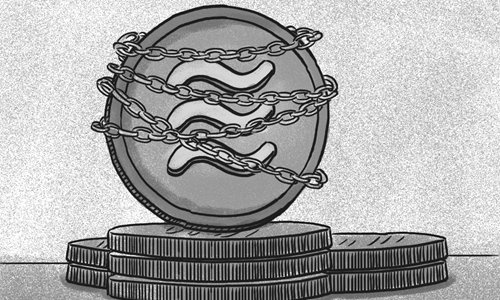HOME >> BUSINESS
Libra is unlikely to become a real currency as negatives outnumber positives
Source:Global Times Published: 2019/7/28 18:23:40

Illustration: Xia Qing/GT
House Democrats have considered a bill aiming at tech companies like Facebook that would ban them from issuing Libra, a new cryptocurrency, and Calibra, a digital wallet. This is not the first time that cryptocurrencies have attracted global attention.
Cryptocurrencies are not real currency. They cannot replace sovereign currency. Today, people have a better understanding of cryptocurrencies. Although Libra aroused great attention when it was announced and has legitimate applications that other cryptocurrencies lack, they will fail as real currency due to their issuing mechanism.
Monetary and financial systems take time to formulate. In the same fashion, cryptocurrencies require protracted institutional reforms. For them to become a monetary milestone, Libra would need to be more than just digital banknotes.
Libra, which was created and issued by private entities, cannot become a real currency as it is not backed by sovereign credibility and cannot serve as a medium of exchange. Since it lacks a centralized mechanism, it cannot fit within existing fiscal and monetary systems. This is what makes a cryptocurrency's value volatile.
It seems Libra has solved price fluctuation problems by pegging itself to a basket of fiat currencies, but that still does not make it a currency. Without sovereign credibility, Libra's stabilization would be impossible to predict.
Libra issuers are seeking regulatory cooperation. They have proposed to comply with anti-money laundering supervision and deposit reserve assets to the central bank, which would address safety issues.
However, Libra's reserve assets cannot be counted as national liabilities. Its value cannot be adjusted according to economic demand as that of standard modern money, and would not achieve the same credibility standards enjoyed by hard currency.
Some might compare Libra to the Hong Kong dollar, a currency from an open economy which is pegged to a fixed exchange rate against the US dollar. After closer inspection, the Hong Kong dollar has profound mechanism support. It is supported by US liquid assets. It is also backed by ample foreign exchange reserves, double the size of its monetary base, to ensure that the Hong Kong Monetary Authority (HKMA) can safeguard against monetary speculation and trim capital movement.
Hong Kong's linked exchange rate system has withstood several crises. The effectiveness of the system is helped by a number of economic attributes enjoyed by Hong Kong that include a flexible economy, a strong and solvent banking system, a prudent fiscal policy and ample foreign currency reserves. Other than these advantages, the HKMA still needs to intervene in the market when needed and prompt market confidence.
In contrast, Libra is without any financial foundations, institutions or adjustment measures. It is suspected that the Libra Association could stabilize its value and guard itself against speculation.
Currency is essentially a medium of exchange. Its value needs to be backed by tangible assets or credible support before it can be accepted by society. Money's evolution from gold to fiat currency backed by sovereign credibility was a natural development. A cryptocurrency, quite the opposite, is a techno-generated payment instrument.
Libra inevitably challenges monetary sovereignty, financial stability, monetary policy and financial regulations. Cryptocurrencies can negatively impact economies in four ways.
First, Libra could affect currencies in non-reserve-currency nations, which are mostly developing countries. In China, capital accounts are not been completely open and internationalization of the yuan is ongoing. The impact of Libra should be guarded against.
Second, it threatens financial stability without a transparent and stable operating mechanism. It also has credibility risks from its issuers. Thus far, a clear description of its operating mechanism is yet to be revealed, and it is particularly unclear how the basket of fiat currencies will determine Libra's value.
Third, Libra could cripple the effectiveness of monetary policies and disrupt economic cycle adjustments. It might replace some fiat currencies and thus distort monetary policy transmission mechanism. Meanwhile, it could also influence financial markets, thus rendering monetary policies counterproductive.
Fourth, Libra could be used as a tool to bypass regulations and supervisions. To make matters worse, Libra could be subject to criminal activities as the digital asset lacks consumer protection and transaction transparency. Criminal investigations involving Libra would be extremely difficult.
It will be hard for Libra to become a real currency, and it would have multiple negative impacts were it to do so. It must undergo thorough introspection regarding the relationship between advanced technology and economic systems. Research and logical thinking will be necessary when analyzing how cryptocurrencies can affect money issuance and creation, as well as financial and monetary stability. Through such efforts, the new technology could better serve macro policies and real economies while preventing financial risks.
This article was compiled from a report published on July 13 by Sheng Songcheng, Counselor of Shanghai Municipal People's Government and Professor of China Europe International Business School (CEIBS), Jiang Yile, a senior staff member at the People's Bank of China Shanghai Office, and Long Yu, a research fellow at CEIBS Lujiazui Institute of International Finance. bizopinion@globaltimes.com.cn
Posted in: EXPERT ASSESSMENT